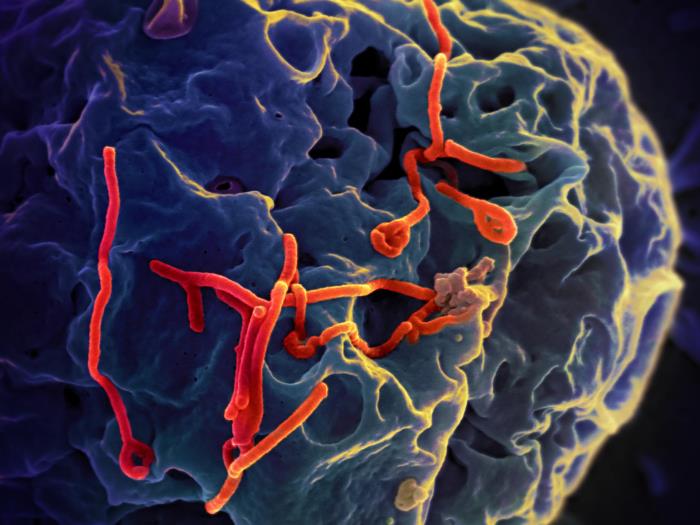Death or Full Recovery? Ebola Outcome May Depend on Your Genes

People infected with Ebola vary greatly in how severe their symptoms are. The majority die, but some develop only very mild symptoms, and it is even possible that some have no symptoms at all. Now, a new study in mice suggests that genetics plays a role in how each body reacts to the same Ebola virus.
To study the relationship between genes and the virus, researchers used a group of mice that were bred to have high genetic diversity, as opposed to the typical laboratory mice, which are produced by many generations of inbreeding and are therefore extremely similar. Normally, classic lab mice don't develop the symptoms of Ebola that are seen in people, even though the animals do die from a lethal dose of the virus.
In the study, among the genetically diverse mice, the researchers saw a full range of Ebola symptoms when they infected the animals with the virus. Some mice were resistant to infection, some showed symptoms but survived, and some were similar to classical lab mice (they died without showing bleeding symptoms). About 40 percent of the animals developed blood and liver problems similar to the hemorrhagic disease that is seen in some Ebola patients, the researchers said.
The findings suggest that "the genetic background of the individual who is infected plays a really significant role in determining how serious their Ebola virus disease is going to be," said co-author Angela Rasmussen, a virologist at the University of Washington.
The research, which began well before the current Ebola outbreak in West Africa, was done in collaboration with the University of North Carolina at Chapel Hill and the National Institutes of Health (NIH). The researchers worked with Ebola virus in an NIH "level 4" lab in Hamilton, Montana, which was designed with all the safety measures required for working with highly dangerous infectious organisms. [5 Things You Should Know About Ebola]
The study was published today (Oct. 30) in the journal Science.
Genes and the virus
Get the world’s most fascinating discoveries delivered straight to your inbox.
The interplay of the Ebola virus and the body's own genetic factors is not unique. In many diseases, scientists have found that the host's response to an infection early on is related to how the disease unfolds.
"We have been working with these mice for other infectious conditions, and we saw an expanded range of disease outcomes with influenza," Rasmussen said. Moreover, other scientists working on cancer and diabetes have reported broad ranges of disease in genetically diverse mice. "So we hypothesized that the same will be true for Ebola," Rasmussen said.
In the study, all the mice lost weight in the first few days after infection. Some of the mice fully recovered. Others developed liver inflammation without the classic symptoms of Ebola, but some had blood that took too long to clot, a hallmark of fatal Ebola hemorrhagic fever in humans. Those mice developed internal bleeding, swollen spleens and changes in liver color and texture.
The researchers found certain genetic differences appeared to be linked to disease outcome among the animals.
"Depending on what kind of disease outcome you have, different genes get turned off and turned on," Rasmussen said.
For example, genes involved in the health of the body's blood vessels were turned down in mice that developed hemorrhagic disease, she said. "We think that control of the inflammation within the vascular system may be important in terms of controlling the hemorrhagic disease that you see in Ebola patients sometimes."
The spectrum of the disease seen in the mice was similar to that observed in the current West African outbreak, the researchers said. In the outbreak, about 18 percent of patients are developing hemorrhagic syndrome, according to the Centers for Disease Control and Prevention. It's not known how commonly people may be resistant to Ebola, because those who might have developed mild or asymptomatic infections, that don't need medical care, wouldn't get documented. [2014 Ebola Outbreak: Full Coverage of the Viral Epidemic]
Ebola patients
In the next steps, the scientists are planning to work to better identify the genes in mice that may be critically important in the disease outcome, and then eventually see if those same genes are at work in people with Ebola, Rasmussen said.
Right now, studying genetic differences between Ebola patients is difficult, especially without knowing where to look in the genome. "You'd really need a lot of people to start making really concrete conclusions about genes that may or may not be playing a role," Rasmussen said.
Genes may turn out to be important in determining the fate of Ebola patients, but they would be just one of the factors involved, Rasmussen noted. The mice in the study were all given the same dose of the virus, via the same route of infection, and they didn't receive treatment.
In human populations, people are infected with varying doses of virus, depending how they get infected, and they also vary in the supportive care and other treatment they receive. Presumably in humans a combination of these things will ultimately contribute to the outcome, Rasmussen said.
Email Bahar Gholipour. Follow Live Science @livescience, Facebook & Google+. Originally published on Live Science.

 Live Science Plus
Live Science Plus





